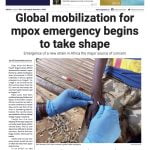The European Commission has mobilised emergency aid for Croatia, after the latter was severely hit by a magnitude 5.4 earthquake on Sunday, which caused widespread damage and cut off electricity in a number of neighborhoods.
“The EU is here to assist Croatia at this difficult time. European support is already on its way,” Janez Lenarčič, Commissioner for Humanitarian Aid and Crisis Management said on Monday.
EU’s Executive body has already helped mobilise tents, beds, matresses, heaters and sleeping bags from the countries who responded to Croatia’s appeal for help. The EU’s Copernicus satellite programme, which provides information based on satellite observation of Earth, is also helping map the affected area.
Croatia, which is in lockdown, activated the Civil Protection Mechanism, as Prime Minister Andrej Plenković said the earthquake was the biggest in Zagreb in the last 140 years.
“We have two parallel crises that contradict each other,” the PM said after an emergency meeting of Croatia’s top officials.
Despite being the worst-affected country by COVID-19 in Europe, Italy has joined Slovenia, Hungary and Austria in the provision of aid, and countries will dispatch the medical, field hospital and protective equipment to the affected areas in Croatia.
Commission mobilises emergency aid for earthquake-hit Croatia
EPA-EFE/ANTONIO BAT
A firefighter walks past rubbles lying on a street after a 5.3-magnitude earthquake that hit near Zagreb, Croatia, 22 March 2020.
- Advertisement -
- Advertisement -







